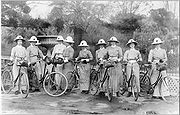
District nurse
Encyclopedia
District Nurses are senior nurses who manage care within the community, leading teams of community nurses and support workers. Typically much of their work involves visiting house-bound patients to provide advice and care, for example, palliative care, wound management, catheter and continence care, medication support. They may be trained to assess patient's needs for equipment provision such as mobility and independent living aids, medical equipment such as specialist beds and mattresses, as well as guidance in applying for grants and welfare benefits. Their work involves both follow-up care for recently discharged hospital inpatients and longer term care for chronically ill patients who may be referred by many other services, as well as working collaboratively with general practitioners in preventing unnecessary or avoidable hospital admissions.
In England and Wales, they are employed by Primary Care Trusts
on behalf of the NHS
, whereas in Scotland, they are employed by the health board and may be based at centralised health centres or general practices. District Nurses, like all qualified nurses, are regulated by the Nursing and Midwifery Council
.
District nurses can also be known as community nurses.
 District Nursing in England will be 150 years old in 2009. In 1858 Liverpool
District Nursing in England will be 150 years old in 2009. In 1858 Liverpool
philanthropist William Rathbone employed a nurse, Mary Robinson, to take care of his wife at home during her final illness. After his wife’s death in 1859, he engaged Mary to go into one of the poorest districts of the City to bring healthcare to people who had no means to pay for it. He spent the rest of his life working to build up the service, with assistance from Florence Nightingale
and others. District nursing on the Liverpool model soon sprang up in other towns, cities and rural areas, funded by local philanthropists.
In 1887 Queen Victoria’s Jubilee Institute for Nurses was founded, centralising training for district nurses (or Queen’s Nurses as they became known) until nursing education became nationalised in 1968. The charity, which became The Queen’s Nursing Institute, continues to support community nurses to this day. The Institute always needed to raise funds and until the creation of the NHS in 1948, district nurses collected contributions from their patients.
Scope of practice
District nurses provide nursing care that allows people to remain in their own homes, maintain their independence, or have additional support after discharge from hospital. A district nurse will manage a team of nurses that may provide wound care, train carers to administer eye drops if individuals can not do it themselves, support catheter care, and administer complex medication within a patient's home as well as immunisations. As well as treatment, a district nurse can offer advice and support with health concerns.In England and Wales, they are employed by Primary Care Trusts
NHS Primary Care Trust
An NHS primary care trust is a type of NHS trust, part of the National Health Service in England. PCTs commission primary, community and secondary care from providers. Until 31 may2011 they also provided community services directly. Collectively PCT are responsible for spending around 80% of the...
on behalf of the NHS
National Health Service (England)
The National Health Service or NHS is the publicly funded healthcare system in England. It is both the largest and oldest single-payer healthcare system in the world. It is able to function in the way that it does because it is primarily funded through the general taxation system, similar to how...
, whereas in Scotland, they are employed by the health board and may be based at centralised health centres or general practices. District Nurses, like all qualified nurses, are regulated by the Nursing and Midwifery Council
Nursing and Midwifery Council
Established in 2002, the Nursing and Midwifery Council is a statutory body set up by the Parliament of the United Kingdom through the . The NMC is the UK regulator for nursing and midwifery professions with a stated aim to safeguard the health and wellbeing of the public...
.
District nurses can also be known as community nurses.
Training
In the UK, training as a district nurse requires registration as a nurse in the adult branch, with at least two years post-qualifying experience of professional practice: a (shortened) degree or postgraduate diploma course is then undertaken, either one year full-time or two years part-time.History

Liverpool
Liverpool is a city and metropolitan borough of Merseyside, England, along the eastern side of the Mersey Estuary. It was founded as a borough in 1207 and was granted city status in 1880...
philanthropist William Rathbone employed a nurse, Mary Robinson, to take care of his wife at home during her final illness. After his wife’s death in 1859, he engaged Mary to go into one of the poorest districts of the City to bring healthcare to people who had no means to pay for it. He spent the rest of his life working to build up the service, with assistance from Florence Nightingale
Florence Nightingale
Florence Nightingale OM, RRC was a celebrated English nurse, writer and statistician. She came to prominence for her pioneering work in nursing during the Crimean War, where she tended to wounded soldiers. She was dubbed "The Lady with the Lamp" after her habit of making rounds at night...
and others. District nursing on the Liverpool model soon sprang up in other towns, cities and rural areas, funded by local philanthropists.
In 1887 Queen Victoria’s Jubilee Institute for Nurses was founded, centralising training for district nurses (or Queen’s Nurses as they became known) until nursing education became nationalised in 1968. The charity, which became The Queen’s Nursing Institute, continues to support community nurses to this day. The Institute always needed to raise funds and until the creation of the NHS in 1948, district nurses collected contributions from their patients.

